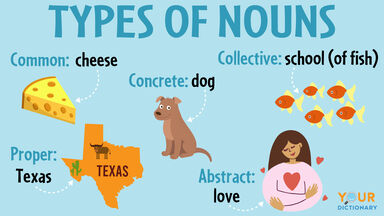What is a Noun?
Nouns make up the largest class of words in most languages, including English. A noun is a word that refers to a thing (book), a person (Betty Crocker), an animal (cat), a place (Omaha), a quality (softness), an idea (justice), or an action (yodeling). It's usually a single word, but not always: cake, shoes, school bus, and time and a half are all nouns.
Types of Nouns
Nouns form a large proportion of English Vocabulary and they come in a wide variety of types.
- Countable Noun - Can be counted (Pencil/pencils, apple/apples, etc.)
- Uncountable Noun - Cannot be counted (Music, milk, food, snow, etc.)
- Compound Noun - Made up of two or more smaller words (Textbook, seafood, snowball, etc.)
- Collective Noun - Refer to a group of things as one whole (Audience, group, family, bunch, etc.)
- Singular Noun - Refer to one person, place, things or idea (Dog, fish, ship, hero, etc.)
- Plural Noun - Refer to more than one person, place, things or idea (Dogs, fishes, ships, etc.)
- Common Noun - Nonspecific people, places, things or ideas (Man, city, religion, etc.)
- Proper Noun - Specific people, places, things... (Isaac Newton, Madrid, etc.)
- Abstract Noun - Something that you can not perceive with your five senses (Belief, love, pride, happiness, peace, etc.)
- Concrete Noun - Something that you can perceive with your five senses (Lion, apple, eyes, flower, etc.)
Nouns as Subjects
Every sentence must have a subject, and that subject will always be a noun. The subject of a sentence is tha person, place, or thing that is doing or being the verb in the sentence.
- Example: Kriss is happy.
Kriss is the subject of this sentence and the corresponding verb is a form of to be (is).
Nouns as Objects
Nouns can also be objects of a verb in a sentence. An object can be either a direct (a noun that receives the action performed by the subject) or an indirect object (a noun that is the recipient of a direct object).
- Example: Give the books to him.
Books is a direct object (what is being given) and him is the indirect object (who the books are being given to).
Nouns as Subject and Object Complements
Another type of noun use is caller a subject complement. In this example, the noun teacher is used as a subject complement.
- Example: Maria is a teacher.
Subject complements normally follow linking verbs like to be, become, or seem. A teacher is what Maria is.
A related usage of nouns is called an object complement.
- Example: I now pronounce you husband and wife.
Husband and wife are nouns used as object complements in this sentence. Verbs that denote making, naming, or creating are often followed by object complements.
Appositive Nouns and Nouns as Modifiers
An appositive noun is a noun that immediately follows another noun in order to further define or identify it.
- Example: My brother, Cesar, is ten years old.
Cesar is an appositive here, further identifying the subject of the sentence, my brother.
Sometimes, nouns can be used adjectivally as well.
- Example: He is a speed demon.
Speed is a normally a noun, but here it is acting as an adjective to modify demon.







Comentarios
Publicar un comentario